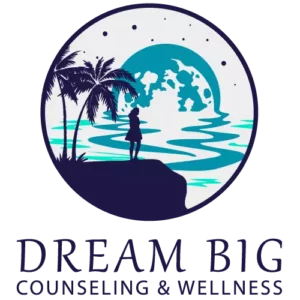Couples therapy strategies offer a blueprint to help partners who are struggling with relationship distress. If you’re searching for effective ways to improve your communication and deepen your emotional connection, here are some proven techniques:
- Improve Communication: Learn to express thoughts and feelings openly.
- Reconnect Emotionally: Rebuild trust and intimacy.
- Resolve Conflicts: Develop strategies to handle disagreements constructively.
- Steer Transitions: Gain skills to cope with life changes.
By focusing on clear communication, mutual understanding, and rebuilding emotional bonds, couples can transform their relationship challenges into opportunities for growth.
Welcome to “Love’s Blueprint: Proven Strategies for Couples Therapy” by Dream Big Counseling and Wellness. Our experienced therapists are here to help couples steer relationship challenges with proven strategies. We focus on a holistic approach, addressing both the emotional and practical aspects of couples therapy. Join us as we explore these strategies to foster healthier, more fulfilling relationships.
Understanding Couples Therapy
When relationships hit a rough patch, it’s easy to feel lost and disconnected. Couples therapy offers a guiding light, helping partners steer through the storm. But what exactly is couples therapy, and how can it help?
Relationship Issues
Common relationship issues include communication problems, trust issues, and intimacy concerns. These challenges can create a cycle of misunderstanding and emotional distance. Couples often find themselves repeating the same arguments without resolution. As Paige Bond, a licensed marriage and family therapist, explains, when partners feel more like roommates than intimate partners, therapy can help rebuild that emotional connection.
Types of Therapy
There are several types of therapy available to address these issues:
-
The Gottman Method: This method focuses on improving communication and managing conflict. It uses structured activities to help couples create shared meaning and rituals of connection.
-
Emotionally Focused Therapy (EFT): EFT is effective for about 75% of couples and helps partners understand their emotional responses and needs. It focuses on de-escalating negative cycles and fostering secure emotional bonds.
-
Narrative Therapy: This approach encourages partners to reframe their relationship stories. By viewing their issues as external to themselves, couples can work together to rewrite their narrative.
-
Solution-Focused Therapy: This method is goal-oriented, helping couples find solutions to specific problems rather than dwelling on issues.
-
Imago Relationship Therapy: This therapy helps partners understand how childhood experiences impact their adult relationships, promoting empathy and understanding.
Emotional Connection
At the heart of any successful relationship is a strong emotional connection. Therapy provides a safe space for partners to be vulnerable and express their needs. As Erin Dierickx, a licensed therapist, notes, therapy allows couples to better understand what is happening for each partner during interactions, especially during conflict.
By addressing these issues and utilizing different types of therapy, couples can work towards a healthier, more fulfilling relationship. Whether it’s through the Gottman Method’s structured activities or EFT’s focus on emotional bonds, therapy offers a blueprint for couples to rebuild and strengthen their connection.
Couples Therapy Strategies
When it comes to couples therapy strategies, there are several effective approaches that therapists use to help partners reconnect and resolve their issues. Each method offers unique tools and insights, allowing couples to choose what best suits their needs.
The Gottman Method
Developed by Drs. John and Julie Gottman, this method is based on over 40 years of research. It emphasizes the importance of positive interactions vastly outnumbering negative ones to sustain a healthy relationship. The Gottman Method helps couples improve communication and manage conflicts. It introduces the concept of the “Sound Relationship House,” which includes building love maps, sharing fondness, and turning towards instead of away during conflicts.
Emotion Focused Therapy (EFT)
EFT is another powerful strategy, proven effective for about 75% of couples who use it. This therapy focuses on identifying and changing negative emotional responses. It helps partners understand their emotional needs and fosters secure emotional bonds. EFT involves steps like identifying negative cycles and accessing underlying emotions to create new patterns of interaction.
Narrative Therapy
Narrative therapy encourages couples to tell their relationship stories and then rewrite them. This approach is particularly helpful when partners blame themselves for relationship issues. By externalizing problems, couples can work together to change their narrative and see their relationship from a new perspective. This can be empowering and transformative, helping partners break free from limiting beliefs.
Solution-Focused Therapy
For couples dealing with specific issues, solution-focused therapy offers a goal-oriented approach. Instead of dwelling on problems, this method helps partners focus on creating solutions and achieving short-term goals. It’s about identifying what works and building on those successes, making it a practical choice for couples seeking quick resolutions to specific challenges.
Imago Relationship Therapy (IRT)
Imago Relationship Therapy digs into how childhood experiences impact adult relationships. By uncovering past traumas and understanding how they manifest in current dynamics, couples can develop empathy and compassion for each other. IRT aims to turn conflict into healing and growth opportunities, fostering deeper understanding and connection.
Each of these couples therapy strategies offers a unique path to healing and growth. Whether couples choose the Gottman Method for its structured approach or EFT for its emotional depth, therapy can be a transformative journey towards a healthier, more fulfilling relationship.
Effective Communication Techniques
Communication is the backbone of any healthy relationship. In couples therapy, improving how partners talk and listen to each other can make a big difference. Here are some key techniques that can help:
Reflective Listening
Reflective listening is all about truly hearing your partner and showing that you understand them. It’s not just about nodding along; it’s about engaging with what your partner is saying. When using reflective listening, you might repeat back what you heard to confirm understanding. For example, if your partner says, “I feel ignored when you’re on your phone,” you might respond, “So, you feel like I’m not paying attention to you when I’m on my phone?”
This technique helps create a safe space for open dialogue, reducing misunderstandings and building trust.
I-Language
Using I-language is a simple but powerful way to express feelings without sounding accusatory. Instead of saying, “You never help around the house,” try saying, “I feel overwhelmed when I have to do all the chores alone.” This shift focuses on your feelings rather than blaming your partner, making it easier for them to understand your perspective and respond with empathy.
Active Listening
Active listening means giving your full attention to your partner without interrupting. It involves being present and engaged, showing that you value what your partner has to say. This can be as simple as maintaining eye contact, nodding, or using verbal affirmations like “I see” or “I understand.”
Active listening fosters a deeper emotional connection and helps partners feel heard and valued. It can be a game-changer in resolving conflicts and strengthening your bond.
These techniques, like reflective listening, I-language, and active listening, are essential tools in couples therapy. They empower partners to communicate more effectively, paving the way for a healthier and more fulfilling relationship.
Emotionally Focused Therapy (EFT) Steps
Emotionally Focused Therapy (EFT) is a powerful tool for couples looking to deepen their emotional bond and resolve conflicts. Let’s break down the key steps involved in this approach:
Assessment
The first step in EFT is assessment. Here, the therapist gets to know the couple and their relationship dynamics. This involves understanding each partner’s perspective and identifying the issues they face. The goal is to uncover the underlying emotional needs and fears that may be driving their conflicts.
Negative Cycle
Once the assessment is complete, the next step is identifying the negative cycle. This is the pattern of interactions that often leads to misunderstandings and conflict. For example, one partner might withdraw when feeling criticized, leading the other to feel abandoned and become more critical. Recognizing this cycle is crucial because it helps partners see how their behaviors contribute to their issues, rather than blaming each other.
Primary Emotions
After identifying the negative cycle, the focus shifts to primary emotions. These are the deep, often hidden feelings that fuel the negative interactions. Common primary emotions include fear of rejection, feelings of inadequacy, or the need for connection. By bringing these emotions to the surface, couples can better understand each other and why they react the way they do.
Conflict De-escalation
Finally, EFT aims for conflict de-escalation. This involves helping partners change their interaction patterns and respond to each other with empathy and understanding. By addressing primary emotions and breaking the negative cycle, couples can de-escalate conflicts and move towards a more supportive and loving relationship.
These steps in Emotionally Focused Therapy are designed to help couples build a stronger emotional connection. By understanding and addressing the underlying emotions and patterns in their relationship, partners can foster a more secure and fulfilling bond.
Frequently Asked Questions about Couples Therapy Strategies
What is the best couples therapy method?
Choosing the “best” couples therapy method depends on the unique needs of each couple. However, Emotion Focused Therapy (EFT) stands out for its effectiveness. According to the American Psychological Association, EFT is effective for about 75% of couples who try it. This method focuses on understanding and changing emotional responses to create a secure bond between partners.
What approach is most common in couples therapy?
The Gottman Method is one of the most common approaches used in couples therapy. Developed by John Gottman, this method emphasizes improving communication and building a strong foundation of friendship and intimacy. It uses a structured approach to address issues like criticism, defensiveness, contempt, and stonewalling—behaviors Gottman identified as predictors of relationship breakdown.
Another widely used approach is Cognitive Behavioral Therapy (CBT). Although originally designed for individual therapy, CBT is adapted for couples to help them understand and change negative thought patterns that affect their relationship. This method is practical and solution-focused, making it a popular choice for therapists.
What are the 9 steps of emotionally focused couples therapy?
Emotionally Focused Therapy (EFT) involves a series of steps designed to help couples reconnect emotionally. Here are the nine steps:
- Assessment: Understanding the couple’s dynamics and identifying their emotional needs.
- Identification of Negative Cycle: Recognizing the interaction patterns that lead to conflict.
- Accessing Primary Emotions: Uncovering deep emotions like fear and inadequacy that drive negative interactions.
- Reframing the Problem: Helping partners see their issues as a cycle rather than individual faults.
- Promoting Acceptance: Encouraging empathy and understanding of each other’s emotional experiences.
- Facilitating Emotional Engagement: Encouraging open sharing of emotions to build trust.
- Restructuring Interactions: Changing how partners respond to each other to foster positive interactions.
- Consolidation: Reinforcing new patterns and behaviors in the relationship.
- Integration: Helping couples apply these new patterns in everyday life to maintain a healthy connection.
These steps guide couples in addressing their emotional needs, breaking negative cycles, and building a more secure and loving relationship.
Conclusion
At Dream Big Counseling and Wellness, we believe in the power of holistic healing to nurture relationship growth. Our approach to couples therapy strategies is designed to help you and your partner reconnect and thrive. We focus on creating a compassionate and supportive environment where you can explore your challenges and work towards positive change.
Our team in Georgetown, TX, is dedicated to empowering you to achieve your fullest potential. We understand that every relationship is unique, and we tailor our therapy services to meet your specific needs. By utilizing proven methods such as the Gottman Method, Emotion Focused Therapy, and Narrative Therapy, we aim to improve communication, resolve conflicts, and strengthen emotional bonds.
Therapy is not just about addressing problems; it’s about building a healthier, more fulfilling relationship. Whether you’re navigating life transitions, rebuilding trust, or simply seeking to deepen your connection, our holistic approach supports your journey towards a brighter future together.
Ready to take the next step in your relationship journey? Contact us at Dream Big Counseling and Wellness to schedule your appointment and start building the foundation for a stronger, more connected partnership.




